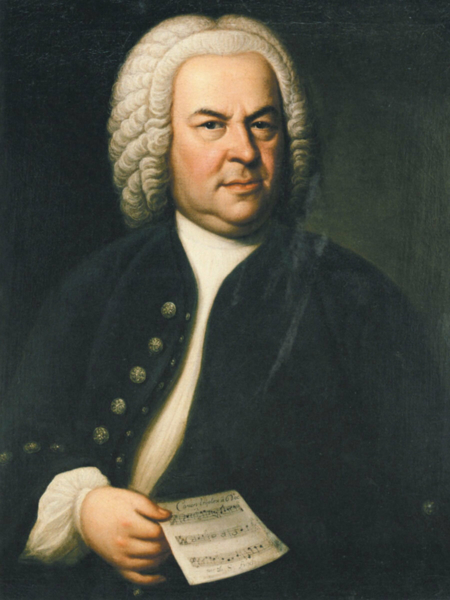Johann Sebastian Bach (1685–1750)
Bach ist heute der wohl bekannteste Musiker des Barock. Der Beginn der Gesamtausgabe der Bach-Gesellschaft (bei Breitkopf) zu seinem 100. Todestag war Grundstein für die starke Präsenz seiner Werke im Konzertleben und in jeder musikalischen Ausbildung.
Johann Sebastian Bachs Schaffen umfasst, die Oper ausgenommen, alle musikalischen Gattungen seiner Zeit. Schwerpunkte liegen häufig eng zusammen mit den Aufgaben des jeweils ausgeübten Amtes: Orgelspiel und Orgelkompositionen forderten die Ämter in Arnstadt und Mühlhausen. In Weimar folgte der erste Kontakt mit dem neuen Typus der Kirchenkantate. Es entstanden in dieser Zeit auch zahlreiche Orgelwerke, darunter das Orgelbüchlein. Als Thomaskantor komponierte er in Leipzig das umfangreiche Repertoire für die Gottesdienste der Hauptkirchen. Mit der Übernahme des Collegium Musicum 1729 bekam er die Möglichkeit weltliches Repertoire aufzuführen. Bach erhoffte sich zudem durch die Publikation einiger Klavierwerke überregionale Resonanz für sein Schaffen.
Johann Sebastian Bach setzte sich intensiv mit Werken anderer Komponisten auseinander. Er suchte in den Werken Buxtehudes Anregung und war stark inspiriert von französischen und italienischen Stilmitteln. Er war bestrebt, alle Möglichkeiten kompositorischer Vielfalt in seinen Werken auszuschöpfen. Die Verbindung von kontrapunktischer Polyphonie mit dem harmonischem Klangbild des Generalbasses findet sich beim ihm in höchstem Maße.
Seine Kompositionen waren hauptsächlich unter Kennern, weniger der breiten Öffentlichkeit bekannt. Die Wiederaufführung der Matthäus-Passion durch Mendelssohn Bartholdy 1829 und der Beginn der Gesamtausgabe der Bach-Gesellschaft (bei Breitkopf & Härtel) zu seinem 100jährigen Todestag waren Grundsteine für die starke Präsenz seiner Werke in der allgemeinen Musikkultur, dem Konzertleben und jeder musikalischen Ausbildung.









